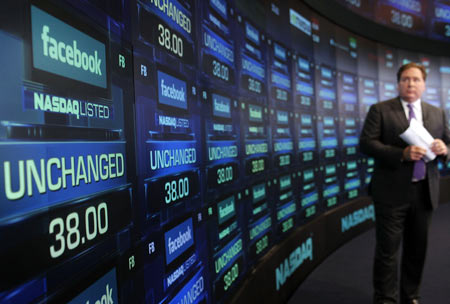
The social network's bumpy ride since its listing highlights the dangers of investing in buzz and hype.
Facebook's debut on the public market in the United States two weeks ago didn't do much to quell the heated chatter about the IPO.
The only big change was that, after a dismal listing a subsequent decline in the stock, the tone switched from being distinctly positive to distinctly negative.
Instead of hearing about the firm's breathless growth, we instead got plenty of reports on the myriad ways that the offering was allegedly mishandled.
Investors that jumped in early were likely shaking their hands and licking their wounds, but even those who stayed on the sidelines can learn plenty from the hubbub.

1. IPOs can be treacherous
Investors had several complaints about the Facebook offering this week. The first was mostly technical. It now seems clear that Nasdaq's systems were not up to snuff for the huge volume of trades that poured through the exchange.
The initial trading went so poorly, there were even rumors this week that Facebook was considering switching its listing to the New York Stock Exchange.
And although the mechanics of trading are important to all investors, most people were more troubled by the news of how revised projections for Facebook's growth were disseminated.
It emerged recently that Morgan Stanley and Goldman Sachs, the merchant bankers behind the process of bringing the firm to the market, revised down projections for Facebook's growth ahead of the IPO, but they told only a small group of clients about it.
There is no sign that the banks did anything illegal, but it does underscore just how big the information asymmetry is for most IPOs. Small investors don't have much to go on before diving into an offering.

They get a few document filings and a few years of historical results. Compare this to the banks and their top clients, who have access to senior management and a much deeper knowledge of the business.
Luckily, this informational advantage fades as a company spends more time on the public markets. Investors of all stripes get to see many more quarters of financial performance and can listen to management conference calls, and more analysts have an opportunity to weigh in on the stock.
As a result, the direction of the business can become clearer. But trying to get in on an IPO that first day is more of a leap of faith than buying an established company's stock.

2. Buzz doesn't equal profit
The Facebook offering also pointed to the dangers of chasing hype. Talk about the future of Facebook was on the lips of not just growth fund managers, but plenty of smaller investors who wanted to get in on the action.
The buzz for Facebook was deafening; a service that touches 500 million people daily has a tendency to do that. But just because something makes great cocktail party conversation, doesn't mean it makes sense as an investment at any price.
Facebook may have a great future ahead of it (and signs look like it does), but if you don't buy the stock when it is trading for a fraction of its value, it can be hard to profit from that growth. If the stock is priced to perfection, it will likely tumble at the first stumble.
If anything, the buzz itself is a good sign that a stock might be frothy. We've seen time and time again investors chasing hot sectors and hot stocks only to be burned as the buzz moves elsewhere. It takes only a cursory glance at Morningstar's investor return data to see how investors have a knack for picking investments at the wrong time.

In Facebook's case, it seems that plenty of investors piled on not because they liked the stock at $38, but because they thought there was a greater fool ready to buy it at $45.
This is a dangerous game to play. If everyone is thinking that way, demand can drop in a hurry, and shares can fall, as we've seen since Facebook's debut. It's important to look beyond what is trendy to what is cheap.
It's not that Facebook isn't a great company; we give it a wide moat rating (implying a firm with huge sustainable competitive advantages) and think it deserves a lofty valuation--just not quite as lofty as the company hoped when it priced its IPO.
Just like any other company, the fundamentals need to support the valuation, and in this case, they didn't justify a stock price well above $38. Perhaps this whole episode will finally debunk the myth that this new wave of firms is somehow immune to normal economics.
The vast majority of investors, particularly those with a long-term focus, let the Facebook IPO come and go without losing a dollar. But the entire episode provided a great lesson on the perils of following the hype.